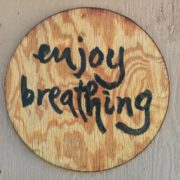5 Intention-setting Ideas to Reduce Stress
“We can never attain peace in the outer world until we make peace with ourselves.”― Dalai Lama
The month of April, among other things, has been designated Stress Awareness Month. The first step to making any change in our life is awareness. Without awareness, we tend to continue on our journeys doing the same old things, repeating old patterns, all while hoping the results will be different.
With awareness comes understanding, which leads to compassion and choice. One of the best habits we can develop for our body/mind/spirit health is learning our personal triggers and noticing when and where we feel stress. To this end, below are some ideas to consider to support this healthy habit:
- Understand common sources of stress. Change – good or bad – tends to create stress. Therefore, recognizing the amount of change we are experiencing in the moment can help the mind to understand why we might not feel ourselves. With this awareness and understanding, we might be more willing to offer ourselves some compassion, letting that compassion support our next choice. We all might recognize that the loss of a partner or other loved one as being stressful, yet we might not be as aware that marriage, pregnancy, retirement from work, quitting smoking, vacation, and/or moving to a new home are stress producing life events. Consider taking a moment to complete the Life Change Index Scale (The Stress Test) to deepen your understanding of what life events are considered stressful and determine your current level of stress from those events.
- Know the symptoms of PTSD. The source of our stress might not be coming from our current experience of change but may be emanating from a past experience of trauma. Most of us are aware that war Veterans may experience Post-traumatic Stress Disorder (PTSD); however, many (I dare say most) of us are not aware that PTSD can be a result of early adverse childhood experiences such as divorce, having a parent with a mental health challenge and/or addiction, and/or witnessing domestic violence, non-the-less more overt abuse and neglect. Consider taking a moment to complete the Adverse Childhood Experiences (ACE) Questionnaire to determine your ACE score and how your childhood experiences may be impacting your current body/mind/spirit health.
- Identify where you experience stress in the body. Once you have gained a greater awareness of what life events (past and present) cause change and stress, consider taking a moment to sit in reflection, welcoming your stress to be present in your awareness, and sense into your body. We all experience stress in our bodies differently. Some of us might experience headaches/migraines. Others might experience digestive issues, such as irritable bowel syndrome (IBS) or gastroesophageal reflux disease (GERD). And others may experience frequent, diffuse muscular and nerve pain. Our bodies hold great wisdom, so taking the time to welcome the sensations and notice where the mind’s awareness is drawn into the body, contributes to the foundation of the healthy habit of acknowledging when and where we are experiencing stress.
- Give yourself permission to learn to relax. Many of us were not taught to value fun and relaxation as a basic human need. In fact, I think the message most of us sensed was that we must work hard to be successful (whatever the definition of success might be for each of us) which does not leave time and space for anything else. So know that it is up to you to challenge that message by embracing a new message, one that allows you to prioritize you. Prioritizing your self-care is not selfish! It is absolutely necessary to find balance and peace and health!! Therefore, consider finding what works for you, whether it is movement, writing, connecting with others, anything that is a way to release stress from the body and mind and give yourself permission to just do it.
- Set limits. I discovered a mantra many years ago that I found very freeing: Say no so others can grow. And yes, it can be easier to say than do! However, with a little practice and a change in perspective, you will find it gets easier. The change in perspective is seeing “saying no” as a gift you are giving the other person (and also to yourself!). For example, when teaching a little one to tie their shoes, at some point you must say to them, “No, I’m not going to do it for you today as I know you know how to do it yourself.” And, although they might get mad and cry (and even scream), if you stick it out, the joy they experience once they have done it themselves is the gift. When you can really embrace this new perspective, you will begin to think “Who am I to think I have to do everything myself and rob others of opportunities for growth?” If one of your personal values is growth then saying no to others can be seen as the necessary rain for the growth of others (and, oh, by the way, for yourself). Setting limits in this way results in growth while reducing stress by reducing the probability that we will overcommit ourselves



